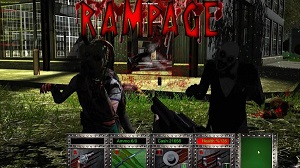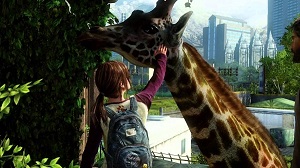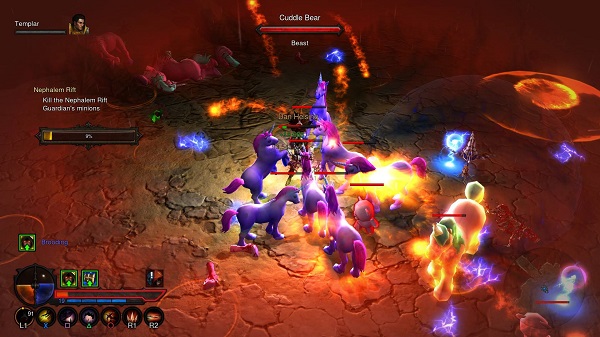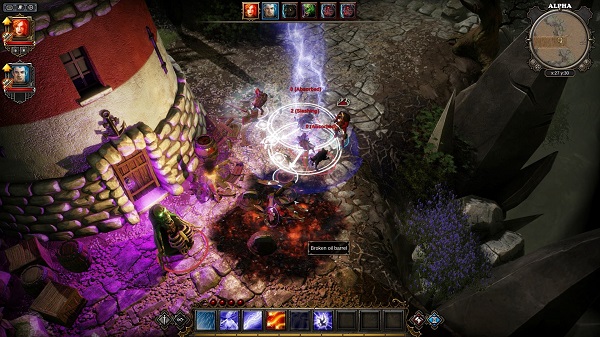I’m going to start off with a wild and crazy idea that is going to seem a wee bit out of step from every other summary of the year on every other website out there: 2014 wasn’t actually that bad a year for video games. It’s been a difficult one for sure: we’ve seen the industry’s sense of ambition come back and bite it in the gluteus in numerous respects and had a rather painful reminder of some of our culture’s most regressively disturbing aspects, and it’s perfectly understandable that gamers go into 2015 feeling slightly bruised by the whole thing.
However, the defeatist and downright wallowing tone of a lot of the 2014 summaries out there doesn’t feel too productive either. There are always lessons to be learned in adversity, and perhaps the sturm und drang of 2014 tells us more about where needs to go than many recognize.
Gamergate: Gaming Paints its Room Black and Actually, it’s About *slap*
 This year showed that even though the average age of gamers may be steadily rising, that maturity is not necessarily reflected in its own culture. Games taking on a more artistic nature and elevating themselves as part of the wider culture may be a wonderful idea, but it’s also created a lot of tension between those who welcome and work towards this change, and those who feel that this threatens games’ status as skill-centric entertainment, tensions that exploded when several prominent females working in and connected with gaming endured vicious online attacks, receiving death threats and having their personal contact details stolen and displayed on public forums. Just talking about the cultural footprint of games, or even expressing worry as a prominent woman in gaming in the first place, was enough for some to have their personal safety compromised – in many cases repeatedly.
This year showed that even though the average age of gamers may be steadily rising, that maturity is not necessarily reflected in its own culture. Games taking on a more artistic nature and elevating themselves as part of the wider culture may be a wonderful idea, but it’s also created a lot of tension between those who welcome and work towards this change, and those who feel that this threatens games’ status as skill-centric entertainment, tensions that exploded when several prominent females working in and connected with gaming endured vicious online attacks, receiving death threats and having their personal contact details stolen and displayed on public forums. Just talking about the cultural footprint of games, or even expressing worry as a prominent woman in gaming in the first place, was enough for some to have their personal safety compromised – in many cases repeatedly.
The representation and treatment of women in games was part of the issue, but Gamergate was also equal parts NIMBY paranoia and the culmination of years of suspicion towards a games media that has itself had a history of maturity struggles. It may be an almighty shitstorm, one which has made unavoidable the unacceptable ugliness of some in the gaming community, but I believe that it’s raised a lot of valid issues that gaming will ultimately work through in order to evolve as a medium. There’s a lot of fear implicit in Gamergate, the kind of fear you see when people in an outsider group are made to confront criticism from what they see as the larger society that has never taken them seriously – at least, not until recently. Ironically this attention, be it from Anita Sarkeesian or those ‘Social Justice Warrior’ journalists Gamergaters love to demonize isn’t the same as what we’ve known in the past. This isn’t Jack Thompson trying to paint games as the root of all evil, a scourge fit for punishing. Instead it comes from legitimate cultural analysis of the kind the medium has never really seen before, arguably affording it far more respect than any anti-gaming blowhard in the past has been able to muster. The fact that many gamers look at this and see only a threat is a shame, but maybe the kinds of people who have reacted like this were always going to be resistant to the idea of their special thing getting accepted by the wider culture in the first place.
Evolution is never easy: its product may be growth but its currency is always trauma, and games and their attendant media have received much needed wakeup calls that have brought to the fore issues that must be discussed. The potential of games as an artistic medium, issues of representation and equality in the games and the industry, the role of games media and what it could/should be saying… Sure, these things have just prompted a lot of melodrama and name-calling so far, but the important thing is that the issues have been brought to the fore, and as the hysteria abates the real questions will begin to be asked – and eventually, the right answers will be found.
Even if we can just get to the stage where outspoken women can exist in the gaming world without being threatened and put in genuine danger, that alone would be a big step in the right direction. Regardless of one’s own view of cultural significance, games journalism or diversity in the field, I think that we can all degree that that behaviour is purely despicable, and will go down in history as the nadir of gamer culture. Either that, or its awkward teenage years where it shouted at its parents and listened to too much Limp Bizkit.
Error Code WTF2014
When it comes to the proliferation of broken and undercooked games, it’s harder to be philosophical. All up, it’s been a shocking year for the major publishers with a string of disastrous launches by games that have been in development for years then delayed for months (An entire year in the case of Sony’s Driveclub) yet still managed to get rushed out of the door in various states of dysfunction.
 This trend has partly been down to publishers’ increasing reliance on day-one patching to handle polish work that really should be done before their games go gold, but also the desperate rush to come out with a game that ‘heralds’ a new console generation for which nobody was apparently prepared. The three games that had been built up as the first true next-gen games – Titanfall, Watch Dogs (No, I’m not putting in the stupid fucking underscore) and Destiny – all ended up disappointing many. Watch Dogs arrived buggy and with significant downgrades to the visuals on which it was largely sold, and Destiny was bogged down with a poor campaign, overly convoluted levelling and a reliance on friends-list party play that gave the cold shoulder to many gamers. Of the three Titanfall arguably came out best, but still launched with server issues and a dearth of content.
This trend has partly been down to publishers’ increasing reliance on day-one patching to handle polish work that really should be done before their games go gold, but also the desperate rush to come out with a game that ‘heralds’ a new console generation for which nobody was apparently prepared. The three games that had been built up as the first true next-gen games – Titanfall, Watch Dogs (No, I’m not putting in the stupid fucking underscore) and Destiny – all ended up disappointing many. Watch Dogs arrived buggy and with significant downgrades to the visuals on which it was largely sold, and Destiny was bogged down with a poor campaign, overly convoluted levelling and a reliance on friends-list party play that gave the cold shoulder to many gamers. Of the three Titanfall arguably came out best, but still launched with server issues and a dearth of content.
Other games, most notably Assassin’s Creed: Unity, tried to fill the gap but released in similarly rough shape. Ubisoft went into 2014 with a lot of bluster, apparently determined to be the ones to kick off the new generation, but instead ended up embodying the worst habits of recent times. Releasing unfinished games to be fixed via restrictive DRM-laden services (Oh, Uplay), teasing games with deceptively impressive mock-ups, clumsy PR gaffes (Those ‘too hard to animate’ female characters) not to mention the use of microtransactions in Unity made for a disastrous year for Ubi. It’s probably no coincidence that their best release this year, the fantastic South Park: The Stick of Truth, also happens to be the game they had the least part in actually making.
 To be fair though, while Ubisoft were arguably the loudest and therefore easiest target, very few publishers get to come out of 2014 with their heads held high. Take Driveclub, which may have eventually turned out just as playable and pretty as promised, still put gamers through months of server failures and had to wait for post-launch updates to receive the polish it was truly sold on (And let’s not even get into that still-elusive Playstation Plus version).
To be fair though, while Ubisoft were arguably the loudest and therefore easiest target, very few publishers get to come out of 2014 with their heads held high. Take Driveclub, which may have eventually turned out just as playable and pretty as promised, still put gamers through months of server failures and had to wait for post-launch updates to receive the polish it was truly sold on (And let’s not even get into that still-elusive Playstation Plus version).
Last but not least, no online gaming service was safe this year from the attentions of – you guessed it – criminal losers on the Internet, with everyone seeming to get hacked or doxxed at least once over the course of the year. Doxxing in particular seems to be a genuine worry, with general consensus suggesting that these attacks are nigh-on impossible to defend against. Having said that, I’m sure your Microsofts and Sonys will figure out a way to do it that’ll suck for everyone in one regard or another, so well done, you keyboard warriors. May puberty strike you hard and without mercy.
Crowdfunding: The Honeymoon’s Over
 It’s been a weird year in crowdfunding, albeit one that’s been very revealing as to what this style of game development means not just to consumers, but also how these games are sold. We’ve seen games get cancelled, and Steam struggle with their own responsibilities when hosting Early Access projects. Several projects, such as The Stomping Land and The Slaughtering Grounds, received large amounts of heat from press and consumers for lack of progress, shoddy production values and poor communication (I actually tried contacting The Stomping Land‘s developers several months ago regarding a possible U/C article: the sole email address provided on their website didn’t work). The developers of The Slaughtering Grounds‘ hilariously ill-advised feud with Jim Sterling didn’t help matters either, further throwing into question to whom we throw money for the promise of games that don’t exist yet.
It’s been a weird year in crowdfunding, albeit one that’s been very revealing as to what this style of game development means not just to consumers, but also how these games are sold. We’ve seen games get cancelled, and Steam struggle with their own responsibilities when hosting Early Access projects. Several projects, such as The Stomping Land and The Slaughtering Grounds, received large amounts of heat from press and consumers for lack of progress, shoddy production values and poor communication (I actually tried contacting The Stomping Land‘s developers several months ago regarding a possible U/C article: the sole email address provided on their website didn’t work). The developers of The Slaughtering Grounds‘ hilariously ill-advised feud with Jim Sterling didn’t help matters either, further throwing into question to whom we throw money for the promise of games that don’t exist yet.
Even some of the more successful crowdfunded projects seemed to hit snags. Frontier Developments, developers of the excellent Elite: Dangerous, sullied an otherwise superbly-run leadup to the game’s general release by announcing the scrapping of a mooted offline mode at the last minute (Though to be fair, at least they’ve managed to launch their game without any online failures – something that seems to have been beyond every major developer this year). Not only this, but there seems to be a trend of high-profile crowdfunded games having weirdly muted releases. Elite got some coverage, but ran into a backlash regarding the non goal-based nature of its gameplay – criticisms that largely seem to be coming from its own community, who have been able to play the game in various states of completion for a year now. Other much-anticipated projects such as Assetto Corsa seem to have limped out into general release with next to no fanfare, in stark contrast to the excitement they generated in the initial Early Access stage.
 Then again, Assetto Corsa was a big deal a year ago, which may have a lot to do with the problem. New games have a certain amount of hype in them before the public move on to the latest shiny thing: most PR strategies revolve around this very concept, aiming to time a game’s promotion so that it reaches its peak ‘hotness’ as it hits shelves. Crowdfunding skews that formula, however, by kicking in the hype cycle to generate that impulse-buy feeling while a game is still early in development. Is this just resulting in games that reach full release with all their hype already burnt out, and a fanbase who have already played them to death and moved on? Let’s not forget projects like Starbound, which hit Early Access in a flurry of positivity that dissipates as the gaps between updates begin to widen, and the prospect of completion seems ever further away.
Then again, Assetto Corsa was a big deal a year ago, which may have a lot to do with the problem. New games have a certain amount of hype in them before the public move on to the latest shiny thing: most PR strategies revolve around this very concept, aiming to time a game’s promotion so that it reaches its peak ‘hotness’ as it hits shelves. Crowdfunding skews that formula, however, by kicking in the hype cycle to generate that impulse-buy feeling while a game is still early in development. Is this just resulting in games that reach full release with all their hype already burnt out, and a fanbase who have already played them to death and moved on? Let’s not forget projects like Starbound, which hit Early Access in a flurry of positivity that dissipates as the gaps between updates begin to widen, and the prospect of completion seems ever further away.
With many of these games still with major additions pending, it throws the whole concept of a full release into question anyway and raises doubts as to the long-term viability of crowdfunding systems. Arguably the only developer to truly get crowdfunding right was Larian, whose superb Divinity: Original Sin was wisely put into a low-key status after the conclusion of its Kickstarter campaign, thus allowing it to remain a surprise once it was released. Many developers would do well to learn from Larian’s sense of restraint, lest we see more crowdfunded projects lose their ‘wow factor’ before they’re actually finished.
Rebootmaster: The Possibly Definitive Edition
Yep, we sure have had a lot of re-releases this year – more than we normally see at the start of a new console generation, though it’s worth remembering that re-releases have always been an early-gen staple. Publishers like them because they can sell consumers some new-gen flash in a familiar package, while developers work on making the most of the new hardware (Which let’s not forget, takes the first year or two of a console’s lifespan to truly get cooking); developers like them because it gives them another crack at late-previous-gen games that may have been compromised by the old hardware, and gamers usually like them if they’re worth the revisit, whether through gameplay additions or the chance to check out games they may not have had the chance to previously because they owned a rival company’s console.
 Re-releases are not intrinsically a good or bad thing. The difference really comes down to individual tastes, the amount of effort that has gone into the retooling of the games and whether individual releases justify the second go-round. Metro Redux, for example, was a chance for one of the last generation’s most unsung franchises to hit the spotlight once more with some genuinely impressive technical improvements, whereas the comparatively conservative work done on The Last of Us: Remastered is offset by the game’s status, and the demand created by the throng of fans won back to Playstation by the PS4.
Re-releases are not intrinsically a good or bad thing. The difference really comes down to individual tastes, the amount of effort that has gone into the retooling of the games and whether individual releases justify the second go-round. Metro Redux, for example, was a chance for one of the last generation’s most unsung franchises to hit the spotlight once more with some genuinely impressive technical improvements, whereas the comparatively conservative work done on The Last of Us: Remastered is offset by the game’s status, and the demand created by the throng of fans won back to Playstation by the PS4.
While there’s been a lot of decrying of the number of re-releases this year, the general high quality of these games has probably been a relief from the publishers’ attempts to give us new current-gen games – which as we talked about above, have by and large been less than successful. At the end of the day we’re only a year into the new consoles’ lifespan, and developers are only now starting to work out the intricacies of these new machines. Not every re-release has felt necessary, but high-quality cases such as the above and others like Grand Theft Auto V on new-gen, Valkyria Chronicles and Oddworld: Abe’s Oddysee: New n’ Tasty have at least made their rehashing worthwhile. That said, let’s hope that we start getting better new and original releases in 2015 so the market doesn’t have to rely on yesterday’s games quite as much.
So that wraps up the first part of our 2014 retrospective. Later in the week we’ll be looking at the games themselves, with the MCP and CHUD Community Game of the Year lists. Has the quality of games really been as bad as everyone has been saying, or should some people be less fixated on what the AAA crowd are doing? Find out more in a couple of days!


